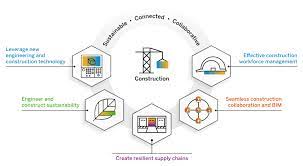The Essential Role of a SAP Software Engineer in Modern Business Operations
The Role of a SAP Software Engineer
As businesses increasingly rely on technology to streamline their operations, the demand for skilled SAP software engineers continues to grow. A SAP software engineer plays a crucial role in designing, developing, and maintaining software solutions that leverage the SAP platform.
Responsibilities of a SAP Software Engineer
A SAP software engineer is responsible for:
- Collaborating with stakeholders to understand business requirements and translate them into technical specifications.
- Designing and developing custom solutions using SAP technologies such as ABAP (Advanced Business Application Programming) and SAP HANA.
- Integrating SAP systems with other applications to ensure seamless data flow across the organization.
- Performing system testing and debugging to identify and resolve issues in the software.
- Providing technical support and guidance to end-users to ensure smooth operation of the software.
Skills Required
To excel as a SAP software engineer, one needs:
- Proficiency in programming languages such as ABAP, Java, or SQL.
- Strong analytical and problem-solving skills to troubleshoot complex issues.
- Knowledge of SAP modules like Finance, Sales, or Human Resources for effective solution development.
- Excellent communication skills to collaborate with cross-functional teams and stakeholders.
- An understanding of business processes to align technical solutions with organizational goals.
Career Outlook
The role of a SAP software engineer offers promising career prospects in the ever-evolving field of enterprise technology. With companies increasingly adopting SAP solutions for their business needs, skilled professionals in this domain are highly sought after by organizations across industries.
In conclusion, being a SAP software engineer requires a combination of technical expertise, problem-solving abilities, and business acumen. By staying updated on the latest developments in the field and honing their skills continuously, professionals can build successful careers as valued contributors to the digital transformation of businesses worldwide.
9 Essential Tips for Excelling as an SAP Software Engineer
- Understand SAP modules and their functionalities.
- Learn ABAP programming language for SAP customization.
- Stay updated with the latest SAP technologies and trends.
- Gain experience in implementing and configuring SAP solutions.
- Develop strong problem-solving skills for troubleshooting issues in SAP systems.
- Collaborate with cross-functional teams to ensure successful SAP projects.
- Obtain relevant certifications to enhance your credibility as a SAP software engineer.
- Practice good documentation habits to maintain clear records of your work in SAP projects.
- Continuously improve your communication skills to effectively interact with stakeholders.
Understand SAP modules and their functionalities.
To excel as a SAP software engineer, it is essential to understand SAP modules and their functionalities. Each SAP module corresponds to a specific business function, such as finance, sales, or human resources. By gaining a deep understanding of these modules, a software engineer can effectively design and develop solutions that align with the organization’s operational needs. This knowledge allows for seamless integration of SAP systems and ensures that the software solutions meet the requirements of various business processes.
Learn ABAP programming language for SAP customization.
To excel as a SAP software engineer, it is essential to learn the ABAP programming language for SAP customization. ABAP (Advanced Business Application Programming) is the primary language used for developing custom solutions within the SAP environment. By mastering ABAP, software engineers can create tailored applications, enhance existing functionalities, and optimize processes to meet specific business requirements effectively. Investing time and effort in learning ABAP programming opens up a world of opportunities for customization and innovation in SAP projects, making it a valuable skill for professionals in this field.
Stay updated with the latest SAP technologies and trends.
To excel as a SAP software engineer, it is crucial to stay updated with the latest SAP technologies and trends. The field of enterprise technology is constantly evolving, and by keeping abreast of new developments, tools, and best practices, professionals can enhance their skills and remain at the forefront of innovation. Continuous learning and adaptation to emerging trends not only ensure that SAP software engineers can tackle complex challenges effectively but also position them as valuable assets in today’s competitive IT landscape.
Gain experience in implementing and configuring SAP solutions.
To excel as a SAP software engineer, it is crucial to gain hands-on experience in implementing and configuring SAP solutions. By actively engaging in the implementation process, engineers can deepen their understanding of how different modules and functionalities work together within the SAP ecosystem. This practical experience not only enhances technical skills but also provides valuable insights into best practices and potential challenges that may arise during implementation. Ultimately, mastering the art of implementing and configuring SAP solutions is key to delivering efficient and effective software solutions that meet the unique needs of businesses.
Develop strong problem-solving skills for troubleshooting issues in SAP systems.
To excel as a SAP software engineer, it is crucial to develop strong problem-solving skills that are essential for effectively troubleshooting issues in SAP systems. By honing these skills, engineers can efficiently identify root causes of problems, devise innovative solutions, and ensure the smooth functioning of SAP software within organizations. The ability to think critically and analytically when faced with technical challenges not only enhances the engineer’s proficiency but also contributes to the overall success of SAP implementations in businesses.
Collaborate with cross-functional teams to ensure successful SAP projects.
Effective collaboration with cross-functional teams is essential for the success of SAP projects. By working closely with professionals from diverse backgrounds, including business analysts, project managers, and end-users, SAP software engineers can gain valuable insights into the specific requirements and challenges of each department. This collaborative approach helps in designing and implementing SAP solutions that not only meet technical standards but also align with the overall business objectives. Clear communication, mutual understanding, and shared goals within cross-functional teams contribute to the seamless integration of SAP systems across the organization, leading to successful project outcomes and enhanced operational efficiency.
Obtain relevant certifications to enhance your credibility as a SAP software engineer.
Obtaining relevant certifications is a valuable tip for aspiring SAP software engineers looking to enhance their credibility in the field. Certifications such as SAP Certified Development Associate or SAP Certified Application Associate demonstrate proficiency in specific SAP technologies and solutions, showcasing expertise to potential employers and clients. By investing time and effort in acquiring these certifications, SAP software engineers can not only expand their knowledge but also validate their skills, ultimately boosting their professional reputation and opening up new opportunities in the competitive IT industry.
Practice good documentation habits to maintain clear records of your work in SAP projects.
To excel as a SAP software engineer, it is essential to practice good documentation habits to maintain clear records of your work in SAP projects. Documenting your processes, configurations, and customizations not only helps you keep track of your work but also enables seamless knowledge transfer within the team. Clear and detailed documentation serves as a valuable resource for troubleshooting, future enhancements, and ensuring consistency across the project. By prioritizing thorough documentation practices, SAP software engineers can enhance the efficiency and effectiveness of their work while contributing to the overall success of the project.
Continuously improve your communication skills to effectively interact with stakeholders.
Effective communication skills are essential for SAP software engineers to successfully interact with stakeholders. By continuously improving their ability to convey technical information in a clear and concise manner, engineers can ensure that business requirements are accurately understood and translated into effective software solutions. Strong communication skills also enable engineers to build rapport with stakeholders, fostering collaboration and trust throughout the development process. Ultimately, honing communication skills empowers SAP software engineers to effectively communicate complex technical concepts and contribute meaningfully to the success of projects.












